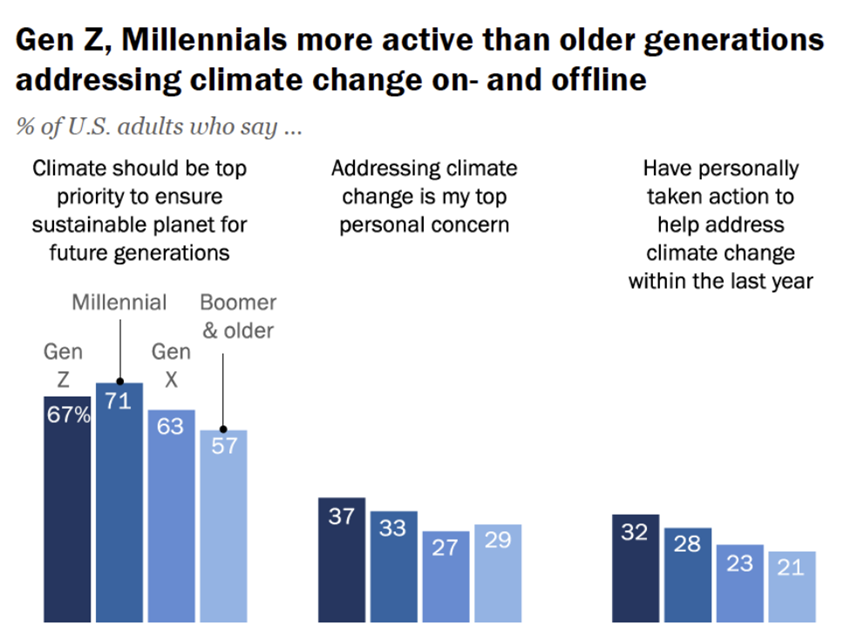According to a Marist poll this year, 85% of Gen Z is very or somewhat concerned about the climate crisis. They are more likely to believe that the climate crisis is caused “mostly by human activity” than any other generation. They believe environmental sustainability is everyone’s responsibility, and it continues to be among Gen Zs’ and millennials’ top priorities. It is a personal concern that consistently weighs heavily on them, with roughly six in 10 Gen Zs and millennials saying they have felt worried or anxious about climate change. The majority of them take action to minimize their impact on the environment. They feel governments should play a bigger role in pushing business to address climate change, and that companies could and should do more to enable consumers to make more sustainable purchasing decisions. Protecting the environment is the societal challenge in which respondents feel companies have the most opportunity to drive change. Gen Zs and millennials are pushing companies to act through their career decisions, and consumer behaviors.

A 2020 study found that if 16% of secondary school (equivalent to middle and high school) students around the world in middle and high income countries studied climate change, it would result in reducing almost 19 gigatons of CO2 by 2050. This is because educated youth would develop personal connections to climate change solutions, and change their behaviors accordingly. Climate education was shown to potentially be a more effective way to reduce emissions than many other single solutions, according to Project Drawdown. Colleges, universities, and even public schools have become increasingly aware of the need for climate change and sustainability education.
Higher Education Requirements for Climate Change
While there is not a universal, federally mandated climate change requirement for all higher education institutions in the United States, there is a strong and increasing trend toward incorporating climate change education into degree programs. Many universities and colleges recognize the urgency of addressing climate change, and are taking proactive steps to make sure their students are equipped with the knowledge and skills necessary to navigate in a climate-impacted world. Some common approaches the institutions utilize include:
- Climate change courses: Some institutions offer dedicated courses that explore the scientific basis, societal impacts, and potential solutions for addressing the impact of climate change
- Interdisciplinary integration: Climate change is often integrated into existing courses across various disciplines, such as biology, environmental science, economics, and sociology
- Sustainability programs: Many universities have established sustainability programs that encompass a wide range of climate-related initiatives, including research, education, and campus operations
- Capstone projects: Some colleges and universities may require students to complete capstone projects or theses that focus on climate change-related topics, allowing them to apply their knowledge to real-world challenges
University of California, San Diego
Most recently, the University of California San Diego (UCSD) implemented an innovative graduation requirement for all students starting in the fall of 2024, a course in climate change. The courses must cover at least 30% climate-related content and address two of four areas, including scientific foundations, human impacts, mitigation strategies, and project-based learning. Approximately 7,000 students from the class of 2028 will be impacted this year. It is important to note that the requirement will not add any additional time to a student’s graduation schedule as it is designed to be integrated into existing classwork. A total of 40 one-quarter courses meet the goal, including “The Astronomy of Climate Change”, “Gender and Climate Justice”, “Indigenous Approaches to Climate Change”, and “Environmentalism in Arts and Media”. Many of the classes that fall under the climate requirement overlap with courses that focus on diversity, equity and inclusion (DEI), the school announced.
Arizona State University
Arizona State University (ASU) has implemented a sustainability requirement for all undergraduate students graduating after the spring 2025 semester. This requirement includes a focus on climate change and environmental issues, aiming to equip students with the knowledge and skills to address these critical challenges. The specific requirements may vary slightly depending on the student’s major, but generally, students will need to complete a designated sustainability course or fulfill a sustainability-related requirement within their major. This could involve coursework, research projects, or community engagement activities. By incorporating sustainability into its curriculum, ASU is demonstrating its commitment to preparing graduates who are equipped to contribute to a more sustainable future.
In addition to UCSD and ASU, Columbia, Harvard, and Stanford have all made significant investments in climate change and sustainability education and research.
- Columbia Climate School: This comprehensive school includes a wide range of climate-related disciplines, including Earth science, environmental policy, and sustainable development. In addition, the school supports innovative research in the science, consequences, and human dimensions of climate change, including the methods of achieving a more sustainable and just world.
- Harvard John A. Paulson School of Engineering and Applied Sciences: Though not exclusively focused on climate, the school offers a variety of programs and research initiatives related to climate change and sustainability, especially in areas like energy and environmental technology.
- Stanford Doerr School of Sustainability: This school is committed to advancing solutions to global sustainability challenges, with a focus on climate change, energy, and the natural environment. In addition, the school offers a Sustainability Accelerator that speeds the translation of Stanford research into scalable technology and policy solutions to address urgent global sustainability challenges.
Climate Change Education in Public Schools
New Jersey was the first state to require climate change education across all subjects, beginning in kindergarten. Connecticut has also mandated climate change education in its schools. While these states have specific mandates, climate change education is often integrated into broader science standards in many other states. Despite growing student interest in learning about climate change and its impact, New Jersey and Connecticut remain the only two states that require by law that climate change be taught in schools. The United States currently does not have mandated national science standards that dictate a climate curriculum; these decisions are made at the state level and vary widely. In addition, there are ongoing efforts to promote climate change education in schools across the United States. Organizations and initiatives are working to provide resources, professional development, and support to educators to help them incorporate climate change into their teaching.
Conclusion
The climate crisis is a significant concern for younger generations, and there is a growing emphasis on climate change education in both higher education and public schools. As the impacts of climate change become more apparent, it is essential that individuals and institutions continue to prioritize addressing this critical issue. Climate change courses help students gain a comprehensive understanding of the causes, effects, and potential solutions to climate change. They help students grasp the scientific principles behind global warming, the impacts on ecosystems and human societies, and the urgent need for action.


